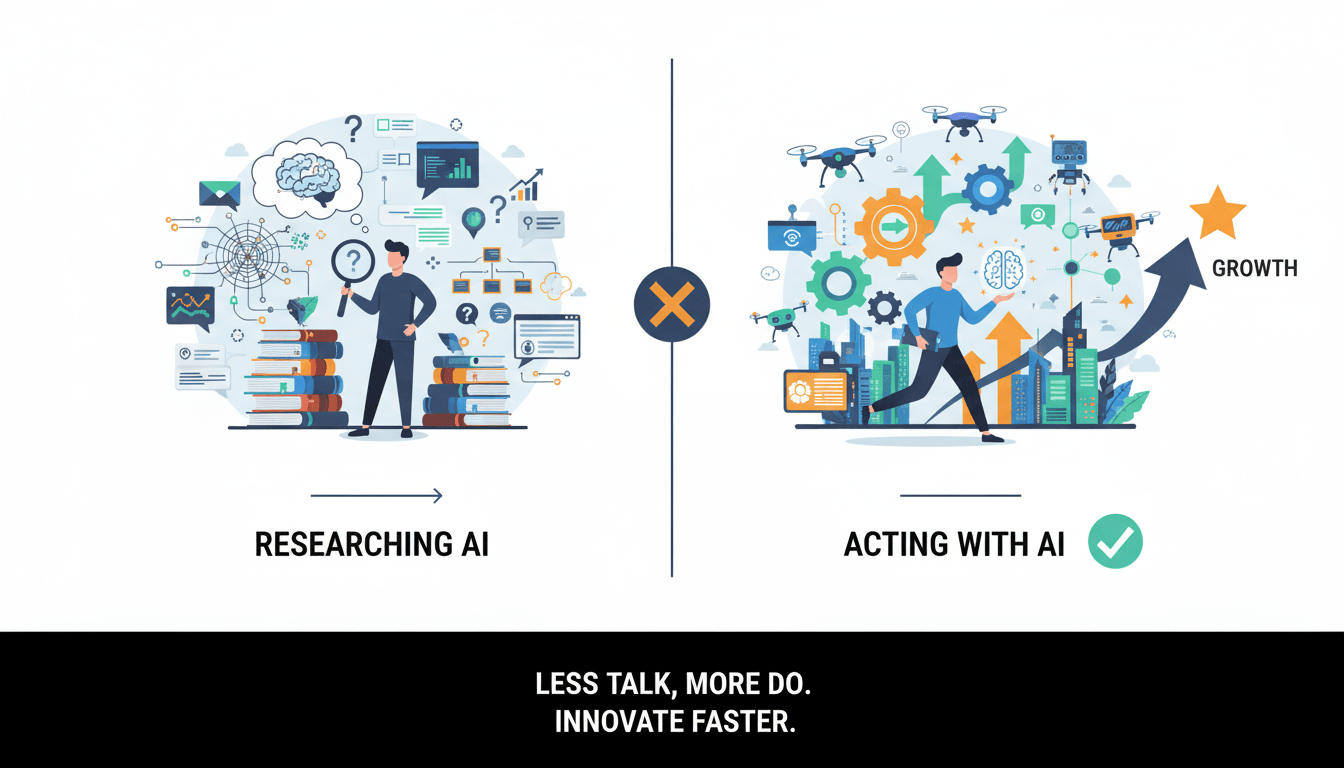· The Rapid Architect Team · AI · 9 min read
Unlocking Operational Efficiency: Custom AI Agents for Small to Medium Businesses
Tired of operational bottlenecks draining your SMB's resources? Discover how custom AI agents revolutionize inventory management, employee scheduling, financial reconciliation, and customer support. Real-world examples show 20-40% efficiency gains, from waste reduction in cafés to lead capture in rentals. Unlock smarter operations—read on for actionable insights and a step-by-step guide!

Unlocking Operational Efficiency: Custom AI Agents for Small to Medium Businesses
Podcast Discussion
In today’s fast-paced business landscape, small to medium-sized businesses (SMBs) face a constant battle to stay agile amid rising costs, supply chain disruptions, and talent shortages. Enter custom AI agents—autonomous software tools tailored to handle repetitive, time-intensive operational tasks. Unlike generic chatbots or off-the-shelf apps, these agents are built to integrate seamlessly with your existing systems, learning from your data to make decisions that drive real efficiency.
Recent trends show that 78% of SMBs adopting AI report improved operational workflows, with many seeing a 20-40% reduction in manual labor hours.[1] For operations-focused leaders, this means shifting from firefighting daily tasks to strategic growth. In this post, we’ll dive into four tailored AI applications for core business operations: inventory management, employee scheduling, financial reconciliation, and customer support automation. Drawing on real-world examples from SMBs, we’ll explore how these agents work, their impact, and practical steps to get started. Whether you’re a café owner juggling stock levels or a service firm coordinating shifts, custom AI can free your team for what matters most—innovation and customer delight.
What Are Custom AI Agents and Why Do SMBs Need Them?
Custom AI agents are intelligent, goal-oriented programs powered by large language models (LLMs) like GPT or open-source alternatives. They go beyond simple automation by reasoning through multi-step processes, adapting to new data, and escalating complex issues to humans. Think of them as virtual employees: they can monitor systems in real-time, execute actions (e.g., placing orders), and report insights—all without constant oversight.
For SMBs, the appeal is accessibility. No longer reserved for tech giants, tools like Zapier, Make.com, or no-code platforms such as CustomGPT.ai allow businesses with limited IT resources to build agents for under $500 monthly.[2] According to a 2025 Aalpha report, SMBs using AI agents see an average 35% boost in operational speed, with payback periods as short as three months.[3]
The key? Tailoring. Off-the-shelf AI might handle basic queries, but custom agents ingest your proprietary data—sales logs, employee calendars, financial ledgers—to deliver hyper-relevant results. In operations, this translates to fewer errors, lower costs, and scalable growth. As one SMB owner noted, “AI didn’t replace my team; it eliminated the grunt work so we could focus on relationships.”[4]
But implementation isn’t plug-and-play. Success hinges on defining clear tasks, ensuring data privacy (via GDPR-compliant tools), and iterating based on feedback. With that foundation, let’s explore specific operational use cases.
Streamlining Inventory Management: Predictive Reordering Without the Guesswork
Inventory mismanagement plagues SMBs, leading to stockouts (lost sales) or overstock (tied-up capital). Custom AI agents tackle this by analyzing historical sales, seasonal trends, and external factors like weather or supplier delays to forecast demand and automate reorders.
Here’s how it works: The agent connects to your inventory software (e.g., QuickBooks or Zoho Inventory) via APIs. It scans real-time data, runs predictive models, and triggers actions like emailing suppliers or adjusting orders. For a small café in the U.S., this transformed chaos into precision.
Real-World Example: A Neighborhood Café’s Waste Reduction Win A small, unnamed café with five employees implemented an AI-powered inventory agent using tools like Make.com integrated with their point-of-sale system.[5] The agent tracked ingredient usage in real-time, cross-referencing sales data with expiration dates and local weather forecasts (e.g., predicting higher iced coffee demand on hot days). When stock dipped below thresholds, it automatically generated reorder lists and even negotiated basic pricing via email templates based on past vendor responses.
Results were immediate: Staff time on administrative tasks dropped 40%, from manual counts to automated alerts. Food wastage fell by 30% through accurate predictions, saving $2,500 annually on spoiled goods. Repeat customers surged 25% as consistent menu availability built loyalty. “We went from reactive restocking to proactive planning,” the owner shared, noting the agent’s learning curve allowed it to refine forecasts after just two weeks.[5]
This isn’t unique to food service. Retail SMBs report similar gains: A 2025 study found AI inventory tools reduce holding costs by 20-25% for businesses under $1M in revenue.[6] To replicate, start with a simple agent prompt: “Monitor daily sales; forecast weekly needs; alert if variance >10%.” Integrate with affordable APIs, and scale as data grows.
Optimizing Employee Scheduling: Balancing Shifts with Precision and Fairness
Employee scheduling is a headache for service-oriented SMBs—overstaffing drains budgets, understaffing frustrates customers. Custom AI agents excel here by optimizing shifts based on demand patterns, employee preferences, and compliance rules (e.g., labor laws), generating fair rotas in minutes.
The agent pulls from calendars (Google Workspace), time-tracking tools (TSheets), and sales forecasts. It uses optimization algorithms to minimize overtime while maximizing coverage, then solicits feedback via quick polls. For a Vienna-based installer, this meant ditching spreadsheets for smart automation.
Real-World Example: Vienna Kitchen Assembly Firm’s Scheduling Overhaul A home improvement SMB specializing in kitchen installations, with 20 field technicians, struggled with manual scheduling amid fluctuating project volumes.[7] They deployed a custom AI agent via Zapier and ChatGPT, linked to their CRM and employee availability forms. The agent analyzed job bookings, traffic data for route efficiency, and staff skills (e.g., prioritizing certified plumbers for complex installs). It generated weekly schedules, flagged conflicts, and auto-adjusted for absences.
Implementation took one week: The team inputted preferences once, and the agent learned from past shifts. Outcomes? Scheduling time slashed 30%, from four hours to under one per week. Accuracy improved 20%, reducing double-bookings that once cost $1,200 monthly in rescheduling fees. Complaints dropped 15%, lifting customer satisfaction 10% via on-time arrivals. One technician said, “It feels fairer—no more last-minute swaps.”[7]
Echoing this, a regional home cleaning franchise with 15 staff used a similar WhatsApp-integrated agent for bookings and shifts, booking 400+ appointments in three months and cutting missed leads from 38% to 9%—saving 40 admin hours monthly.[3] For SMBs, tools like Deputy or When I Work with AI add-ons start at $5/user/month. Prompt tip: “Optimize for cost, coverage, and equity; output as calendar invites.”
Automating Financial Operations: From Chaos to Compliant Cash Flow
Financial ops—reconciling accounts, tracking expenses, drafting reports—consume disproportionate time in SMBs, often pulling owners from growth activities. Custom AI agents automate these by scanning receipts, categorizing transactions, and flagging anomalies, ensuring accuracy and audit-readiness.
Connected to accounting software (Xero, FreshBooks), the agent processes uploads via OCR (optical character recognition), matches invoices to payments, and generates summaries. For a solo accountant, this unlocked billable hours.
Real-World Example: London Solo CPA’s Time-Reclaiming Agent A one-person CPA firm in London, serving 120 SMB clients with $180K annual revenue, spent 8-10 hours weekly on routine emails and reports.[3] They built an AI agent using Zapier, ChatGPT, and Gmail, pulling tax deadlines from Google Sheets. The agent drafted personalized reminders (e.g., “Your Q3 VAT filing is due—here’s a summary”) and basic reports, with tone adjustments for client relationships. Human review ensured compliance before sending.
After prompt refinement over a month, drafts hit 90% accuracy. The CPA saved nine hours weekly, redirecting to new clients for $12K extra revenue yearly. Response times fell 70%, from days to hours, boosting client retention 15%. “It’s like having a junior accountant who never errs on basics,” the owner reflected.[3]
Broader data supports this: AI accounting tools cut error rates 50% for SMBs, per a 2025 Fuelfinance analysis.[8] General automation, like expense tracking in QuickBooks AI, handles 80% of reconciliations autonomously.[9] Start small: Train on sample ledgers with prompts like “Categorize expenses; flag duplicates >$50; draft reconciliation note.”
Enhancing Customer Support Operations: 24/7 Responsiveness Without the Overhead
Customer support ops extend beyond queries—they involve lead qualification, ticket routing, and follow-ups that tie up resources. Custom AI agents act as tireless frontliners, handling inbound interactions while escalating escalations, ensuring SMBs punch above their weight in service.
Integrated with phone systems (Twilio) or email (Zendesk), agents use NLP to qualify leads, book slots, and log interactions. For a luxury rental firm, this captured revenue otherwise lost to after-hours silence.
Real-World Example: Choice Signature Luxury Car Rental’s Lead Explosion An Atlanta-based luxury car rental SMB, partnered with Elite Web Professionals, fielded 1,000+ monthly calls but lost leads to unanswered after-hours inquiries.[10] They rolled out Vendasta’s AI Voice Receptionist in a hybrid setup: Human first, AI fallback. Trained on scripts for rideshare vs. daily rentals, the agent qualified prospects (e.g., “Do you have a chauffeur’s license?”), captured details, and scheduled viewings via calendar sync.
In four months, it handled 1,017 calls, capturing 778 qualified leads—a 76% conversion rate. This turned missed opportunities into $50K+ in bookings, with zero added headcount. “Leads that vanished now convert instantly,” noted the owner.[10] The agent’s 24/7 availability matched enterprise-level service at SMB costs.
Similar wins appear in e-commerce: A Texas boutique store’s AI bot cut support tickets 67%, saving $1,000/month in labor.[3] Tools like Intercom AI start free, scaling to $50/month. Key prompt: “Qualify based on budget/service; route high-value to human; log all in CRM.”
Implementing Custom AI Agents: A Step-by-Step Guide for SMBs
Ready to build? Follow these steps:
Identify Pain Points: Audit ops—where do bottlenecks occur? Use free tools like Google Forms for team input.
Choose a Platform: No-code options (Zapier, $20/month) for beginners; code-based (LangChain) for advanced.
Gather Data: Securely upload samples (anonymized) to train the agent. Ensure compliance with tools like GDPR-ready LLMs.
Build and Test: Define prompts (e.g., “If X, do Y; else escalate”). Pilot for two weeks, measure KPIs like time saved.
Integrate and Scale: Link to core systems; monitor with dashboards. Budget $100-300 initial setup.
Many SMBs recoup costs in month one.[1] Resources: Aalpha’s guide[3] or CustomGPT.ai tutorials.[2]
Overcoming Challenges: Security, Adoption, and Iteration
Hurdles exist: Data privacy risks (mitigate with encrypted APIs), employee resistance (train via demos), and over-reliance (keep 20% human oversight). Start small—one task—to build buy-in. Iterate quarterly, using agent logs for refinements. As one study notes, 60% of AI failures stem from poor prompts—refine relentlessly.[11]
Conclusion: AI as Your Operations Ally
Custom AI agents aren’t futuristic—they’re operational lifelines for SMBs, turning drudgery into data-driven decisions. From the café’s waste cuts to the rental firm’s lead surge, real examples prove 20-40% efficiency gains are achievable today. Invest now, and watch your business operate smarter, not harder. What’s your first task? Share in the comments.
References
[1]: Activdev, “AI for SMEs: 5 Real-World Case Studies,” https://www.activdev.com/en/artificial-intelligence-for-smes-case-studies-examples/ (March 14, 2025).
[2]: CustomGPT.ai, “How To Build Custom AI Agents From Scratch,” https://customgpt.ai/how-to-build-custom-ai-agents/.
[3]: Aalpha, “AI Agents for Small Businesses - In-Depth Guide - 2025,” https://www.aalpha.net/blog/ai-agents-for-small-businesses/ (May 10, 2025).
[4]: Noem.ai, “How Can AI Agents Revolutionize Small Business Efficiency?” https://noem.ai/blog/how-can-ai-agents-revolutionize-small-business-efficiency/.
[5]: MyMobileLyfe, “How AI-Driven Workflow Automation Can Revolutionize Small Business Operations,” https://www.mymobilelyfe.com/artificial-intelligence/how-ai-driven-workflow-automation-can-revolutionize-small-business-operations/ (June 28, 2025).
[6]: Katana MRP, “AI for Inventory Management: Gimmick or a Way Forward?” https://katanamrp.com/blog/ai-for-inventory-management/.
[7]: i-Pangram, “AI Agents at Work: SMB Success Stories You Can’t Ignore,” https://www.ipangram.com/post/ai-agents-at-work-smb-success-stories-you-can-t-ignore (April 23, 2025).
[8]: Fuelfinance, “AI for Finance: Examples and Use Cases,” https://fuelfinance.me/blog/ai-for-finance (April 9, 2025).
[9]: SMB Solutions, “7 Great Examples of How AI is Helping Small Businesses,” https://www.smbsolutions.com.au/7-great-examples-of-how-ai-is-helping-small-businesses/ (January 22, 2025).
[10]: Vendasta, “How an AI Receptionist for Small Business Helped Capture 700+ Qualified Leads,” https://www.vendasta.com/blog/ai-receptionist-for-small-business/ (August 14, 2025).
[11]: Rapid Innovation, “Top 15 AI Agent Use Cases in Business,” https://www.rapidinnovation.io/post/top-15-use-cases-of-ai-agents-in-business.




